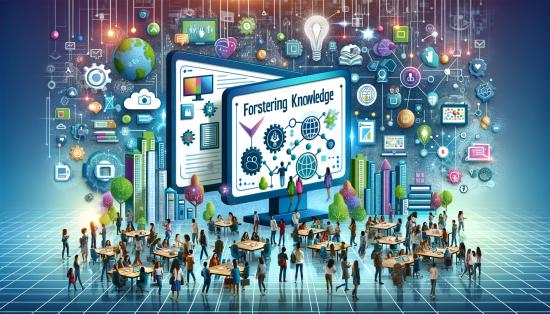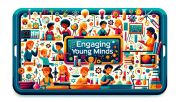
Fostering Knowledge: Leveraging E-Learning Communities and Platforms
Explore the realm of e-learning communities and platforms, their essential features, benefits, and upcoming trends in online education.
An e-learning community is a group of individuals who come together to learn and collaborate on various topics using online platforms. These communities can be found on social media, dedicated e-learning websites, or forums, and they provide a valuable space for individuals to share knowledge, resources, and support. E-learning communities have become increasingly popular due to the rise of e-learning platforms, which offer a wide range of courses and educational materials. These platforms have played a significant role in fostering the growth of e-learning communities by providing a centralized hub for individuals to connect and engage with one another. Additionally, e-learning communities thrive on the key features that make them successful, such as accessibility, inclusivity, and interactive engagement. By leveraging these features, individuals can easily join, participate, and contribute to e-learning communities, creating a rich learning environment for everyone involved.
The rise of e-learning platforms has been a game-changer in the field of education. With the increasing demand for flexible and accessible learning options, e-learning platforms have become a popular choice for students and professionals alike. These platforms offer a wide range of courses, from technical skills to soft skills and everything in between. The convenience of being able to access these courses from anywhere at any time has made e-learning platforms a preferred choice for many.
Key Features of Successful E-learning Communities have become increasingly important as the rise of e-learning platforms continues to revolutionize the way people access education. These communities play a crucial role in providing support, engagement, and a sense of belonging to learners. One key feature of successful e-learning communities is active participation and engagement from both learners and instructors. This fosters a sense of community and encourages collaborative learning. Another important feature is the availability of resources and support, including discussion forums, live chat sessions, and access to knowledgeable mentors and moderators. Additionally, successful e-learning communities prioritize diversity and inclusion, providing a platform for learners from different backgrounds to come together and learn from each other's experiences. These communities also focus on generating engaging content to keep learners motivated and committed to their learning journey. Finally, successful e-learning communities are proactive in addressing challenges and adapting to the ever-evolving landscape of e-learning, paving the way for future trends in community engagement.
Joining e-learning communities can provide a range of benefits for students, instructors, and professionals. One of the main advantages is the opportunity to connect with like-minded individuals who share similar interests and learning goals. This sense of community and support can help students stay motivated and engaged in their studies. Additionally, e-learning communities often offer access to a wealth of resources, such as study materials, practice exercises, and discussion forums. By participating in these communities, learners can gain valuable insights and perspectives from their peers and mentors, enhancing their overall learning experience. Furthermore, being part of an e-learning community can also open doors to networking and career opportunities, as members can connect with industry professionals and experts in their field. Overall, joining e-learning communities can enrich the learning process and provide a supportive environment for personal and professional growth.
When it comes to e-learning platforms, there are several popular options that have built strong communities around them. Platforms such as Coursera, Udemy, and Khan Academy have amassed large user bases, offering a wide range of courses in various subjects and disciplines. These platforms provide learners with the opportunity to connect with like-minded individuals, share knowledge, and engage in discussions about the topics they are studying. Coursera, for example, has a thriving community forum where learners can ask questions, seek advice, and connect with other learners from around the world. Udemy also fosters a sense of community through its instructor-led discussions and peer-to-peer interactions. These platforms have truly revolutionized the way people access education, offering not only a wealth of learning resources but also a supportive community environment.
When it comes to choosing the right e-learning platform for you, there are several factors to consider. First, you should assess your learning goals and determine what type of content you are interested in. Some e-learning platforms specialize in specific subjects, such as technology, business, or creative arts, while others offer a more diverse range of courses. Additionally, consider the format of the courses offered on the platform. Do you prefer self-paced learning, or do you thrive in a more structured environment with scheduled live sessions? Another important aspect to consider is the level of interactivity and community engagement offered by the platform. Look for features that facilitate discussions, peer-to-peer learning, and access to mentors or experts in the field. Finally, take into account the platform's reputation, user reviews, and the availability of any free trials or sample courses to test the platform before committing to a subscription.
The role of moderators and mentors in e-learning communities is crucial for creating a supportive and engaging learning environment. Moderators are responsible for managing the discussions and interactions within the community, ensuring that they remain respectful, on-topic, and productive. Mentors, on the other hand, play a key role in guiding and supporting learners as they navigate through their courses. They provide valuable feedback, answer questions, and offer insight based on their own experiences. Together, moderators and mentors work to foster a sense of community and collaboration, making e-learning platforms more effective and enjoyable for everyone involved.
In order to generate engaging content for e-learning, it is important to understand the needs and preferences of the target audience. Whether it's creating interactive videos, designing visually appealing slideshows, or developing informative blog posts, the content should be tailored to the learning objectives and the interests of the learners. Utilizing storytelling, gamification, and multimedia elements can further enhance engagement and retention. Additionally, incorporating quizzes, polls, and interactive exercises can encourage active participation and reinforce learning. It's also crucial to keep the content updated and relevant, as well as provide opportunities for discussion and collaboration among the learners. By leveraging the capabilities of JSON data format, e-learning platforms can efficiently capture and deliver engaging content to the users in a structured and organized manner.
One of the biggest challenges faced by e-learning communities is the lack of personal interaction and engagement. Although e-learning platforms have made education more accessible and convenient, they often lack the human connection that comes with traditional classroom learning. This can make it difficult for learners to stay motivated and engaged, leading to a higher dropout rate. Additionally, the online nature of e-learning communities can also lead to a sense of isolation and disconnect, especially for learners who thrive in a social learning environment. Another challenge is the need for effective moderation and mentorship within e-learning communities. Without proper guidance and support, learners may struggle to navigate the online learning space and may not receive the help they need to succeed. Finally, the rapid technological advancements and the ever-changing digital landscape also pose a challenge for e-learning communities, as they must constantly adapt to new tools and technologies to stay relevant and effective.
As we look to the future of e-learning and community engagement, there are several trends that are likely to shape the landscape of online education. One of the key trends we can expect to see is the integration of artificial intelligence (AI) and machine learning into e-learning platforms, which will enable more personalized and adaptive learning experiences for users. Additionally, we can anticipate the continued growth of virtual reality (VR) and augmented reality (AR) technologies in e-learning, offering immersive and interactive learning environments. Another trend to watch for is the increased focus on mobile learning, as more learners access educational content through their smartphones and tablets. Furthermore, with the rise of remote work and decentralized teams, collaborative and social learning tools are expected to become more prominent in e-learning communities, fostering a sense of connection and collaboration among learners. Overall, the future of e-learning is likely to be marked by technological advancements that enhance engagement, personalization, and connectivity in online education.
Related posts






